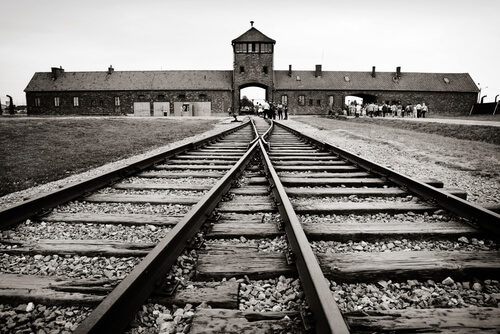A Fantastic Love Story Amidst the Horrors of Auschwitz

This is a fantastic Auschwitz love story that was only revealed to the world many years after it happened. Of course, there’s something magical in every love story. However, some, like this one, show that love really is capable of saving a human being, in this case in a literal sense.
The protagonists of this love story were a Pole named David Wisnia and a Hungarian named Helen Spitzer. She’d been the first to arrive at the concentration camp and had come from Slovakia, where she’d just finished her university degree. The year was 1942, and her Jewish status made her one of the 2,000 single women who were imprisoned.
Helen’s condition was pitiful. At first, she was put to work demolishing some minor buildings. Before long, she was malnourished, contracted typhus, and then malaria, but still had to work every day. To top it off, an old fireplace collapsed on her and shattered her back. This meant that she could no longer work in that trade.
“What is done for love is beyond good and evil.”
-Friedrich Nietzsche-
Helen Spitzer and the will to survive
The Nazis noted that Helen was an educated woman, and, in the aftermath of her accident, they thought they might be able to get more out of her in other trades. After all, she was a girl with a university degree, she spoke German, and also had a solid foundation in graphic design. Thanks to this and a stroke of luck, she ended up in an office job.
At first, she was only tasked with preparing the red paint with which a line was drawn on the uniform of the women arriving at Auschwitz. However, later, she gained the trust of her guards and was then in charge of registering the arrival of each woman who entered the camp.
Later, she was charged with organizing Nazi paperwork and making monthly reports on concentration camp workers. Hers was a privileged position and, because of that, she could bathe frequently, in addition to wearing decent clothes.
Even so, Helen never collaborated with the Nazis. In fact, she took advantage of her position to misplace death sentences or transfers.
David Wisnia
David Wisnia’s story was different. He arrived at Auschwitz at the beginning of 1943 and was entrusted with the task of collecting the bodies of prisoners who’d been electrocuted on the fences of the camp.
Before long, word spread that he was a great singer and the Nazis took an interest in him. In fact, he was forced to sing for them at their private gatherings.
At the same time, he was given a better position within the camp. He had to disinfect the clothes of the newcomers in a place that everyone knew as ‘the sauna’. While there, he saw Helen for the first time, a woman unlike any other Jew in the camp. She smelled good and was always groomed.
It was also clear that Helen was completely au fait with all the workings of the camp and that the Nazis trusted her. David saw her as someone far removed from him. However, one afternoon she was passing by ‘the sauna’ and they suddenly found themselves to be alone. Thus began their love story.

The love story of Auschwitz
In that first meeting, they talked. Furthermore, they arranged to meet again a week later. Their ‘date’ was in a small space between two crematoria. Helen paid other prisoners with food to let them know if anyone was coming. This encounter was repeated again and again during the following months. That’s how their love story progressed.
Although they spoke little and hardly had any time with each other, the two promised to meet in Warsaw after the war. Some months later, David was transferred to another camp, but managed to escape.
Helen also escaped, a few weeks later. However, while David found some American soldiers and went with them, Helen went to Warsaw and waited for him in vain.
They both ended up marrying other people and leading independent lives. David had two children and several grandchildren, while Helen had no children. In the end, by chance, they both ended up living in the United States. A mutual friend once tried to reunite them, but Helen refused. Nevertheless, David wanted to see her and he insisted on the meeting.
They finally met again 72 years after their parting. She was in bed, sick, and already a widow, and he was still singing. In fact, during the meeting, David sang a song to her in Hungarian.
He also wanted her to clear up a doubt. He wondered if the Nazis had once wanted to kill him and she’d intervened to prevent it. Helen smiled. She raised a hand and showed her fingers: “Five times,” she replied.
All cited sources were thoroughly reviewed by our team to ensure their quality, reliability, currency, and validity. The bibliography of this article was considered reliable and of academic or scientific accuracy.
Paci, F. (2017). Un amor en Auschwitz: una historia real. Aguilar.
This text is provided for informational purposes only and does not replace consultation with a professional. If in doubt, consult your specialist.









